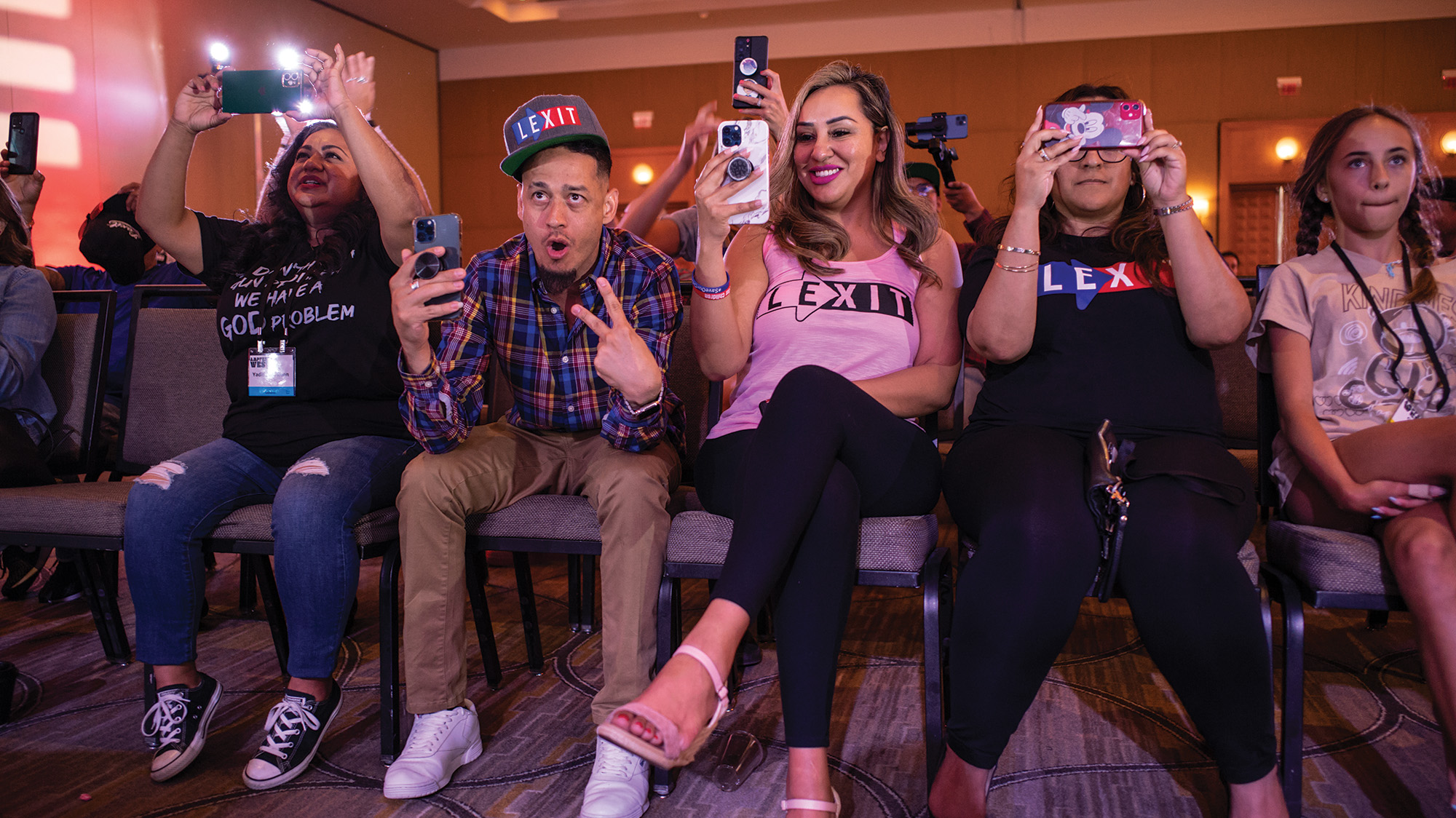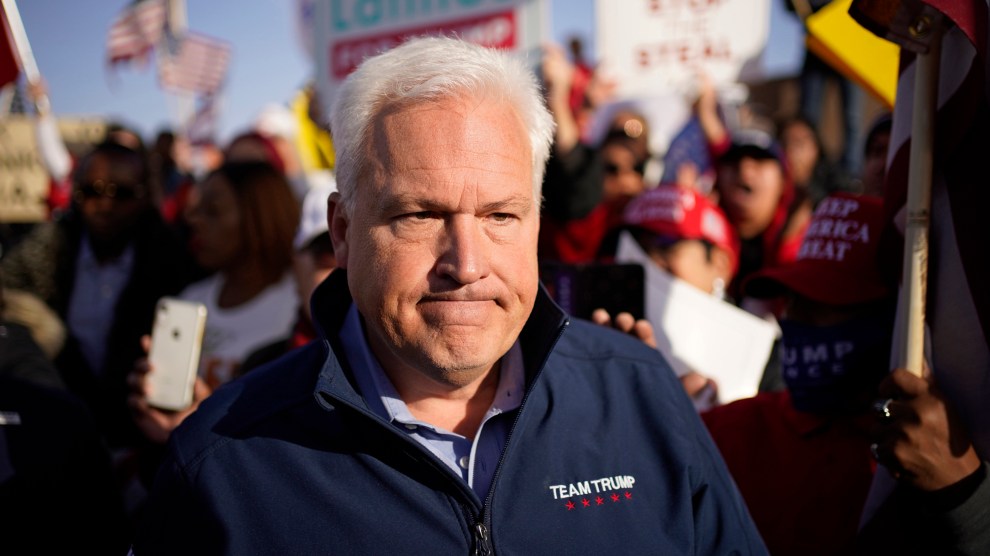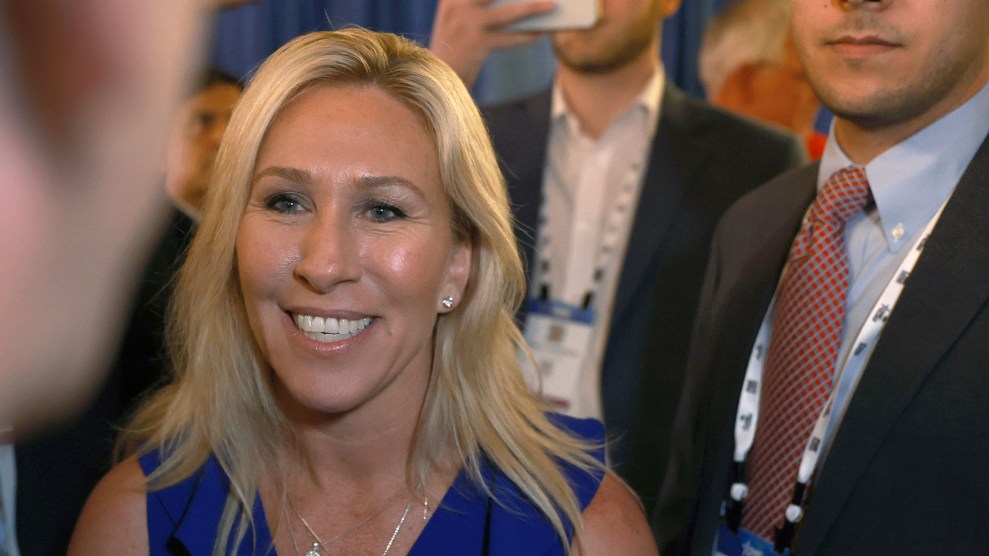In 2018, two years before YouTube de-platformed “Dark Web philosopher” and alt-right star Stefan Molyneux for violating its hate speech policies, he was one of the big names featured at the first American Priority Conference in DC. The event was marketed as a free speech extravaganza of Trump-supporting activists and influencers not welcome at more traditional Republican confabs like the Conservative Political Action Conference (CPAC), the oldest, largest, and most influential right-wing gathering in the country. But when Molyneux showed up, he discovered conference rooms mostly full of empty chairs. So he bailed.
Embarrassing turnout might have put an end to this event. Instead, AMPFest, as it’s now known, relocated to the Trump National Doral Miami hotel in 2019, added a golf tournament and a $75,000 sponsorship package, and scored appearances by Donald Trump Jr. and Rep. Matt Gaetz (R-Fla.). Suddenly it became a top destination in the right-wing convention circuit, providing yet another platform for disgraced MAGA-world politicos like former national security adviser Lt. General Michael Flynn, Roger Stone, campaign operative George Papadopoulos, and right-wing filmmaker Dinesh D’Souza, all of whom were pardoned by President Donald Trump for various crimes.
AMPFest is just one new entry on a right-wing event scene that has exploded in recent years. When I first started covering conservative conferences, in 2009, the options consisted mainly of the annual Values Voter Summit, sponsored by the evangelical Family Research Council, and the then-annual CPAC. Now there are dozens of events, and they reflect how the GOP marketplace incentivizes and rewards the worst actors the party has on offer, and distills it to a roux of disinformation and commercial opportunity for all who participate.
Just a small sampling of the summer ’22 offerings: In June, AMPFest held a new extravaganza in California, branded as a MAGA Coachella. That same weekend, former White House Press Secretary Kayleigh McEnany and Lara Trump were lighting up 2,500 conservative students in Dallas at the Turning Point USA Young Women’s Leadership Summit. Two weeks later, Ralph Reed, one of the original whiz kids of the religious right, hosted his Faith and Freedom Coalition’s “Road to Majority” conference at the Opryland Resort in Nashville, starring Donald Trump, with a roster of special guests that commingled Republican members of Congress with anti-vaccine activists such as Stella Immanuel (the Texas doctor who believes some gynecological problems are caused by having sex with demons), and, yet again, McEnany. In late July, Trump appeared at TPUSA’s Student Action Summit in Tampa, with Don Jr., Gaetz, and Sens. Ted Cruz (R-Texas) and Josh Hawley (R-Mo.). McEnany was there too.
The September lineup offers the Truth & Liberty Coalition Conference in Colorado, starring Rep. Lauren Boebert (R-Colo.), and the Family Research Council’s new Pray Vote Stand event. Taking into account the various anti-vaccine conventions, Trump’s American Freedom Tour, and Flynn’s ReAwaken America tour—held at megachurches and showcasing conspiracy theorists, QAnon devotees, and MyPillow’s Mike Lindell—a partisan could attend a spectacle every other weekend.
CPAC chair Matt Schlapp can’t keep up with the demand. “States are calling us. Governors are calling us,” he told me in July, and international requests are skyrocketing. The reason, he said, is that a CPAC will “garner an amazing amount of media attention. The exposure is intense.” When we spoke, he was getting ready for CPAC Texas, which starts August 4th. It would be “all about the midterms,” he said and would feature a host of candidates who would use the event “to meet donors. They’re going to meet activists. They’re going to be recruiting people to work on their campaigns.” Hungarian authoritarian leader Viktor Orbán, who’d headlined a CPAC conference in Budapest last May, is also scheduled to speak.
With no analog on the left, these events are an underappreciated component of the MAGA infrastructure. Amplified by conservative media, they help propel candidates and influencers far beyond in-person audiences. Even as they claim to showcase the GOP’s best and brightest, they also provide a national platform for disgraced politicians, bona fide criminals, and others who might have trouble finding a real job—but discover the conference circuit to be a generous source of speaking fees and book sales. These gatherings are a stew of nationalist ideas and conspiracy theories served to the movement’s most enthusiastic base, priming them for future election battles. And oh, the merch!
There are now so many conservative events that they are practically a full-time job for a host of Trump acolytes. Among them is Tana Goertz, a former Apprentice contestant who became a Trump campaign spokesperson. Perhaps best known for once comparing Trump to Mother Teresa, she now is a fixture on the conservative talk circuit. She has spoken at three AMPFests and is scheduled to appear at another in October. Her contract prevents her from disclosing how much American Priority paid her, but Goertz’s normal fees range between $10,000 and $20,000 for a live appearance.
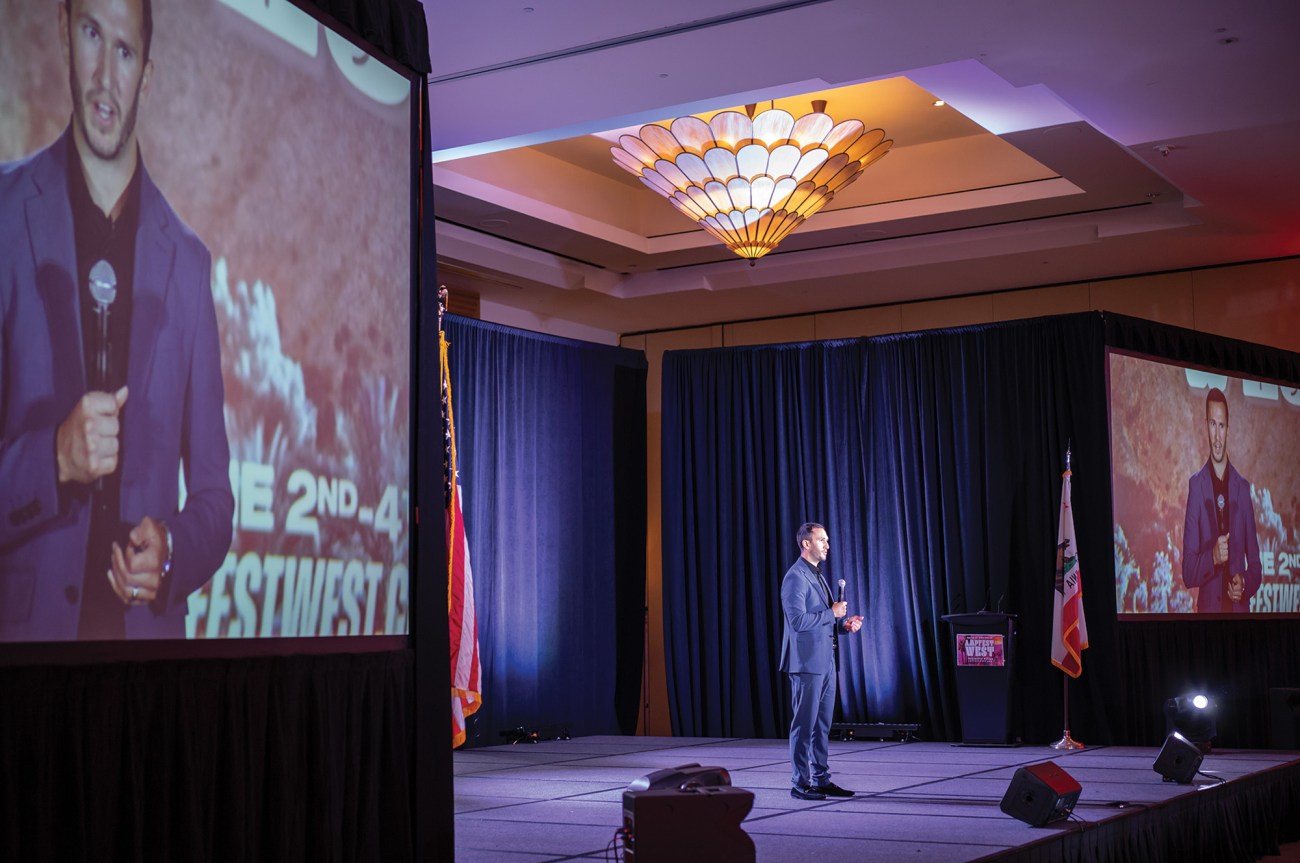
School choice proponent Corey DeAngelis fires up the AMPFest West crowd.
David Butow
She thinks people on the right find a tremendous amount of camaraderie at these affairs. “The energy is so positive. It’s all uplifting,” she says. “We have the same like-mindedness.” People can wear their American flag gear and come face to face with a lot of “MAGA celebrities—people that became famous or popular fighting for their rights, singing songs about freedom, or losing your jobs for freedom.” Plus, conferences are accessible to ordinary people in ways that insider political events aren’t. General admission to AMPFest West starts at $449, and vip access is $899. “If you have the money, you can go in,” Goertz says. “You can look at these people who you admire and find their boldness inspiring, and you can be with them for a day and experience them.”
These events also offer a springboard for purported victims of woke cancel culture or otherwise infamous actors seeking to become GOP candidates, a dynamic that pushes the party further to the extremes. Think Mark McCloskey, the Missouri lawyer who brandished an assault weapon at Black Lives Matter protesters in St. Louis in 2020. He spoke at CPAC this year and is running for Senate. Or Shelley Luther, the Dallas salon owner jailed for opening her salon during the pandemic lockdown in 2020. She appeared at CPAC last year before launching a failed bid for Congress. “It’s politics as entertainment,” says Ron Filipkowski, a Florida trial lawyer, former federal prosecutor, and ex-Republican who has been chronicling the swell of GOP extremism via a popular Twitter feed that often showcases video clips from these events. “They’re making rock stars out of these people, but a lot of them are nutjobs.”
Schlapp sees it differently. “We try to look for the people who don’t sound like everyone else,” he said, explaining why they don’t invite just any GOP member of Congress. “We try very hard not to be the Republican convention, which is so boring it becomes terrible TV. People want spontaneous questions. They want emotion, and that keeps people watching. CPAC gives you that.” As the ensuing onslaught of media coverage, good or bad, shows, he said, “nobody can deny that [CPAC] is the center of political gravity.”
The conference that inspired a multitude of imitators was launched in 1974 by the brain trust of the emerging New Right: Paul Weyrich, Richard Viguerie, and Morton Blackwell, all veterans of Barry Goldwater’s failed 1964 campaign for president. As Anne Nelson explains in her book Shadow Network: Media, Money, and the Secret Hub of the Radical Right, CPAC was designed to train a new generation of activists to fight the culture wars and reenergize conservatives demoralized by the Watergate scandal: “Blackwell argued that debating ideas wasn’t enough; the young conservative recruits needed practical skills. As a result, the first CPAC offered panels on direct mail fundraising and campaign techniques to its four hundred attendees. The inaugural keynote was delivered by California’s then governor, Ronald Reagan.”
Today, with its rock-concert production values (cost: $3–$4 million), CPAC has become a command performance for any Republican presidential aspirant, and the proving ground for lower-level candidates. The event is organized by the nonprofit American Conservative Union (ACU), and according to its IRS filings, the last CPAC held before the pandemic began drew a record 18,000 people, up from about 10,000 in 2016. That doesn’t include the 2,000-plus journalists who attended and the additional 9 million people who watched on YouTube. When I started attending CPAC, in 2009, the only network that provided comprehensive coverage was C-SPAN.
But in 2021, Fox Nation paid $250,000 to become CPAC’s official streaming partner. Fox Nation also streams most TPUSA events and Ralph Reed’s roadshow—providing the right-wing media ecosystem with the content it craves while amplifying conferences’ influence far beyond those who pay to attend.
Even before the Trump era, CPAC was a playground for the party’s wingnuts. “CPAC isn’t just a showcase for the party’s brightest stars and biggest ideas,” my colleague Tim Murphy observed presciently in Mother Jones in 2013. “It also offers a close-up view of the underbelly of the conservative movement—the hacks and hucksters who helped lead Republicans astray.”
A decade ago, CPAC came under fire for featuring white nationalists on a panel. Today such views have arguably moved center stage, with Trump and Tucker Carlson as headliners. Even so, organizers walk a fine line in trying to keep out the party’s most embarrassing racists or professional trolls drawn to the show, like the vendors selling anti-Muslim T-shirts, or white nationalists like “groyper” Nick Fuentes, who is always trying to crash the party. (After CPAC banned them, Fuentes and the groypers started a rival conference—same time, same town.)
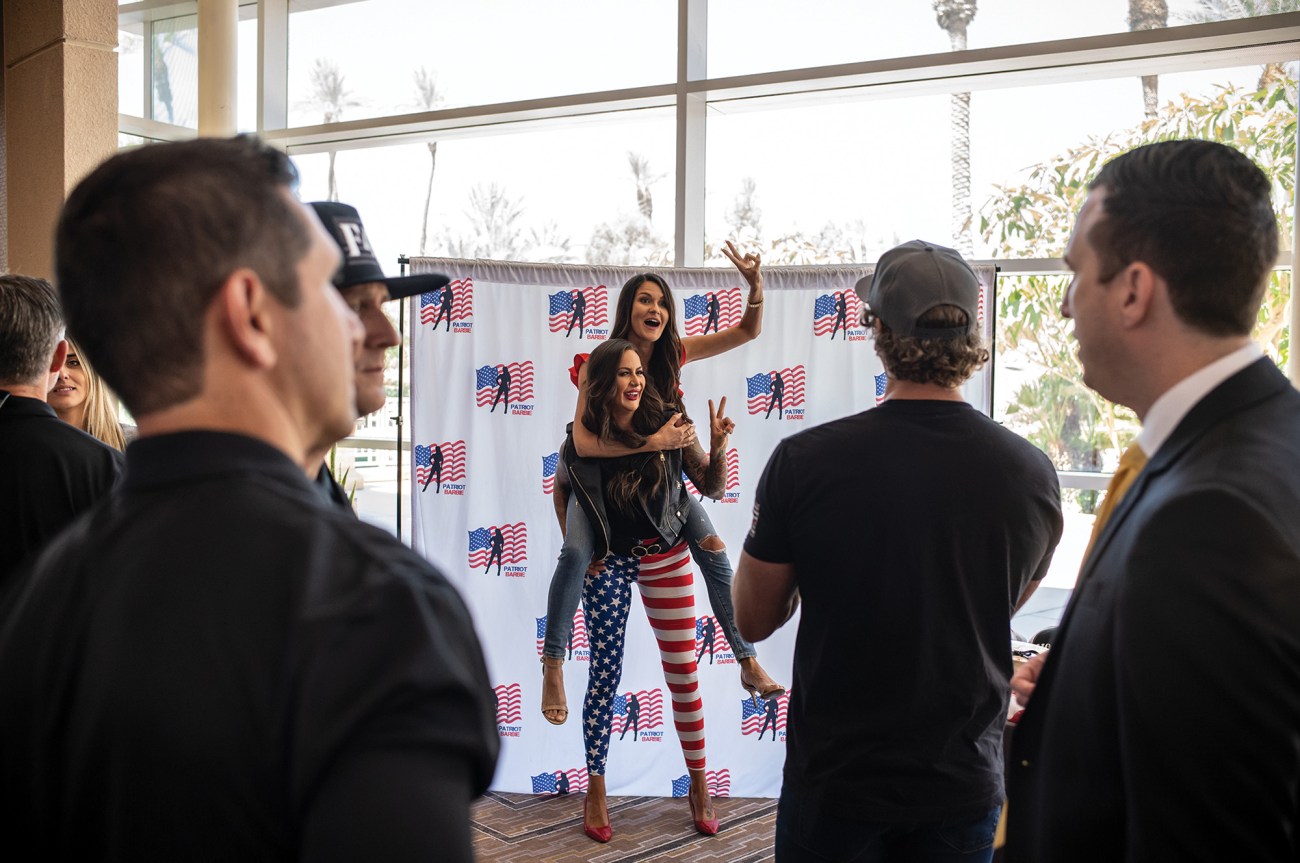
AMPFest West brought conservative speakers and candidates to a resort hotel in this desert city near Palm Springs for a weekend gathering.
David Butow
Even when CPAC does keep the right’s biggest kooks out of the convention, they often show up at the venue anyway, ensuring even more media coverage. For instance, in 2019, I joined a gaggle of other reporters outside the event hall to watch a press conference convened by conspiracy theorists Jacob Wohl, Laura Loomer, and Jack Burkman, none of whom were allowed in the convention itself. They presented “evidence” they claimed would prove that Rep. Ilhan Omar (D-Minn.) had once been married to her brother, allegations she has called “disgusting lies.”
Increasingly, even the show’s location itself has become a statement. In February 2020, Trump and members of the White House Covid task force took to the CPAC stage to downplay the threat of the virus. Afterward, CPAC disclosed that a VIP guest who’d been in close quarters with high-level officials had come down with Covid. Undeterred, the group reconvened a year later, decamping from Maryland to Florida, where Gov. Ron DeSantis graced the main stage and welcomed attendees with open arms, and none of the statewide mask requirements and attendance limits that had nearly eliminated conventions throughout the rest of the country.
I missed that conference, but in February this year I headed to the swank Rosen Shingle Creek hotel in Orlando, where thousands of CPAC attendees had paid at least $295 for general admission to the four-day confab. An additional $375 would provide access to the Ronald Reagan dinner, where Glenn Beck spoke. Platinum tickets, which entitled holders to exclusive events with legislators, backstage access to famous speakers, and a photo op with a main stage celeb, ran $7,000 and higher.
Inside the hotel, unmasked people trailed like schools of fish behind former Trump officials, including Secretary of State Mike Pompeo. Attendees mobbed media row for selfies with the ubiquitous McEnany. The conference, slugged as “Awake Not Woke,” lured potential GOP presidential contenders, from South Dakota Gov. Kristi Noem to Cruz and DeSantis. And of course, Trump, who, Schlapp said, considers CPAC “one of the most aesthetically pleasing arrangements…He always feels like he and other speakers look great up there.”
Debbie Epling, a county GOP chair from South Carolina, considers CPAC “the Academy Awards for conservatives. It’s like one rock star after another.” Decked out in Trump earrings and a red, white, and blue dress, she told me it was a place to network with conservative “worker bees,” other county party chairs, and people running for local office.
Rhonda Sarris had come as a 75th birthday present to herself. “It’s nice to be in a red state,” she told me, wearing “I Heart the Electoral College” sunglasses and clutching a Trump teddy bear. “It’s nice to know when I’m back in Colorado with my kitty that I’m not alone,” she said. A former county election judge and a delegate to the GOP’s state convention, Sarris was thrilled to hear DeSantis speak; she would vote for the Florida governor for president—though not if he ran against “our real president,” Trump.
At the conference, she said she met Sharon Caldwell, whose husband was arrested last year for allegedly taking part in the January 6 insurrection, which Sarris believes was a “complete setup.” Caldwell was raising money to try to save her family’s farm, Sarris said, and her story “made me cry.” Prosecutors allege Caldwell’s husband, Tom, helped organize the Oath Keepers’ “quick reaction force” that was prepared to transport weapons into DC to prevent the peaceful transfer of power. He has been charged with seditious conspiracy, along with Oath Keepers leader Stewart Rhodes, and is awaiting trial.
Tom Caldwell maintains his innocence and has claimed to be nothing but a disabled veteran. But after the Capitol breach, according to prosecutors, he texted and posted social media messages like “If we’d had guns I guarantee we would have killed 100 politicians. They ran off and were spirited away through their underground tunnels like the rats they were.” In early July, prosecutors revealed that a search of Caldwell’s home had turned up a “death list” of Georgia election officials. The photo that frequently accompanied news stories about his arrest was taken at CPAC, which he attended in 2019.
CPAC was never a model of decorum but at least there was a time when panels would cover policy matters like, say, taxes and Social Security. But today, culture wars dominate and the whole affair has become a measuring stick for how extreme the party has become. The congressional crazy caucus was well represented in Orlando. Chief among them: Rep. Marjorie Taylor Greene (R-Ga.), who appeared on a panel titled “They Can’t Shut Us Up!” Even the most damaged GOP candidates found a welcome spot on the main stage. Witness US Senate candidate Eric Greitens, who was just defeated in the GOP primary. He resigned as Missouri governor in 2018 after being indicted on felony charges related to allegations that he’d tied up and sexually assaulted his hairdresser, with whom he’d been having an affair, and threatened to release a nude photo of her if she didn’t stay quiet about it. (Greitens has denied the allegations, and the charges were dropped.)
Just as CPAC can help rehabilitate fallen conservatives, it can seize on those enjoying a brief moment of celebrity and offer them greater legitimacy. That’s what happened to Stacy Langton. Last year, the mother of six appeared before a Virginia school board to complain that she’d discovered the graphic memoir Gender Queer in a high school library. She went from stay-at-home mom to convention speaker in just five months: “A surreal thing,” she says. First came the onslaught of interviews: Church Militant, Trump foreign policy adviser Sebastian Gorka, and yes, I profiled Langton for Mother Jones. Then Mercedes Schlapp, a former Trump White House adviser and the wife of Matt, recruited her for a CPAC panel because she wanted to have a “real mom voice.”
Langton’s panel on “pupil propaganda” was moderated by Candace Owens, a Black conservative commentator who rose to national fame through pro-Trump activism, and also featured two members of Congress and a contributor to the National Review. They discussed how liberals indoctrinate public school children with critical race theory and smutty gay comic books.
People like Langton compose the bread-and-butter panels at CPAC—filling the time between Fox News stars and aspiring presidential candidates—and many of them do it for free. Organizers “didn’t offer me a dime,” Langton told me, not even for her travel expenses. She doesn’t mind; she was going to go anyway. “It’s an opportunity to get the message out.”
There’s no better example of the way CPAC can launch a political star than Trump. The now-defunct gay conservative group GOProud organized his first CPAC appearance, in 2011, when he was seen as a supporter of LGBTQ rights and was first flirting with running for president. Jimmy LaSalvia, GOProud’s co-founder, told Politico that Trump’s speech “helped him to realize his path to the Republican nomination.” LaSalvia now regrets encouraging Trump to run for president and has left the GOP. But that initial appearance, along with $150,000 in donations to the ACU, the nonprofit behind CPAC, put Trump on the permanent lineup, even though many conference devotees initially considered him too liberal to appear.
Critics say CPAC has played a significant role in normalizing extremism by elevating controversial figures for prominent roles. “These people 10 or 20 years ago would have been looked at as fringe, fringe, fringe, even within CPAC themselves,” says Peter Montgomery, a senior fellow at the civil liberties group People for the American Way, who’s attended many conservative conventions. He points to Frank Gaffney, whom the Southern Poverty Law Center calls “one of America’s most notorious Islamophobes” and “a dangerous threat to Democracy.” CPAC banned Gaffney in 2011 after he falsely accused two ACU board members of working for the Muslim Brotherhood. “They didn’t want to be associated with a crazy bigot,” a board member explained to journalist Sarah Posner at the time. Five years later, Gaffney was back, moderating a panel on “Countering Global Jihad.”
Jack Posobiec was banned in 2017 after he helped spread the Pizzagate conspiracy theory that a (nonexistent) Democratic pedophile ring run by Hillary Clinton was located in the (also nonexistent) basement of DC’s Comet Ping Pong pizzeria. Posobiec, a former commentator for far-right media outlet OANN, has appeared publicly with white nationalists like Richard Spencer, and his own antisemitic views have been well documented. This year, he appeared on the main stage in Orlando and as the closing speaker at CPAC’s Budapest event.
“I obviously don’t believe that we’re endorsing extremism,” said Schlapp, who considers Gaffney a “friend and an ally.” With anywhere between 150 and 250 speakers, Schlapp admits, “sometimes we make errors.” Last year, for instance, CPAC invited Young Pharaoh to speak, only to discover that the hip-hop star had a long history of antisemitic social media posts. (CPAC canceled his appearance.) Schlapp describes the process of putting on the show as “big and messy,” but insists, “That’s what democracies are. Overall, I’d say our batting record is good. We’re going to keep expanding the universe of people that want to listen to our content. If that means I’ll get criticized because we have Tulsi Gabbard on the stage, fine. We’re going to keep doing that. CPAC would be awfully boring if everything sounded like a CPACpress release. Why would you go?”
“Kyle Rittenhouse Sentenced to 45 Years of CPAC Appearances,” joked The Onion in November 2021, after a jury acquitted the teenager of all criminal charges related to his fatal shooting of two people at the protest against police violence in Kenosha, Wisconsin. The Onion writers presciently nailed a key aspect of the conservative conference ecosystem.
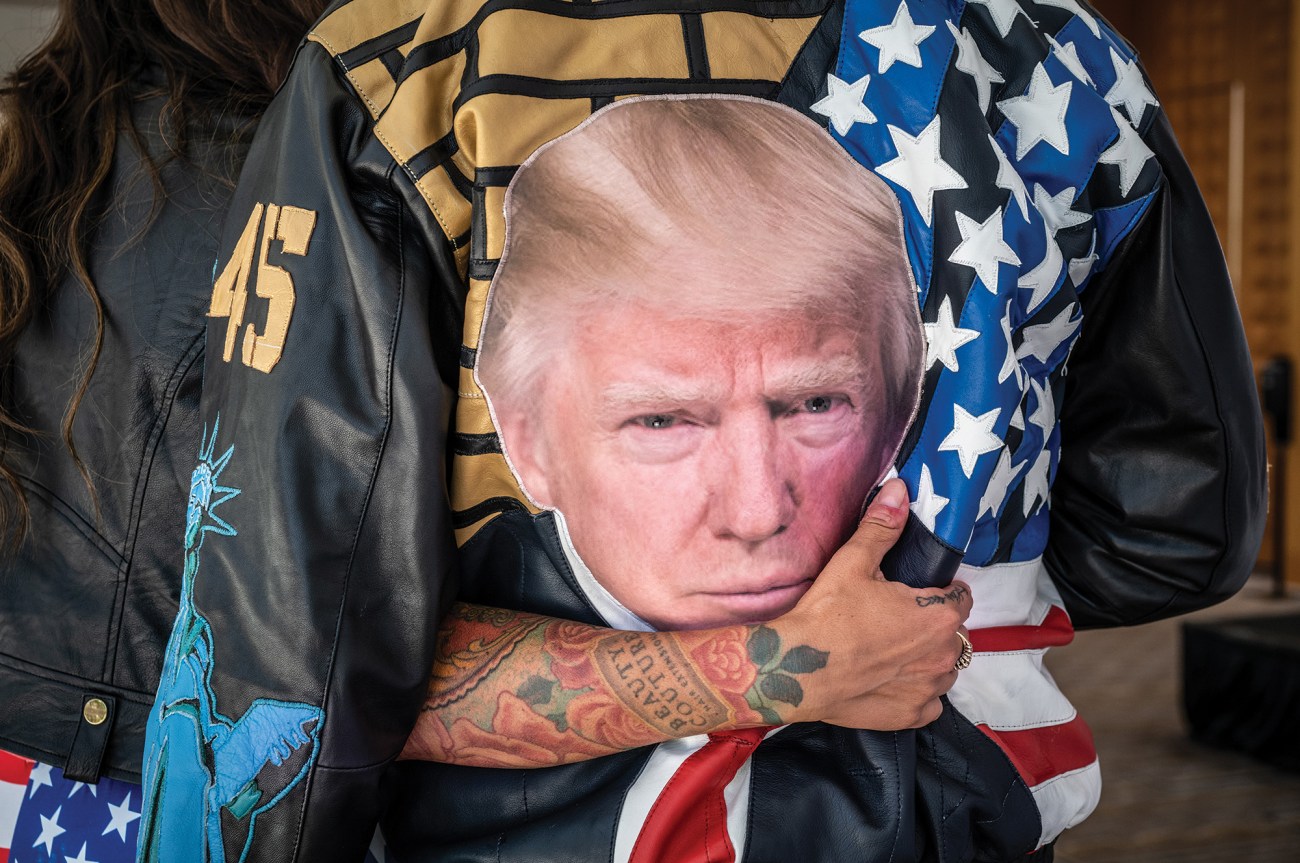
AMPFest West attendees show their pride in former President Trump.
David Butow
A month after his acquittal, Rittenhouse took the stage against a backdrop of fireworks at the Turning Point USA AmericaFest, a four-day blockbuster event for young conservatives in Phoenix that attracted more than 10,000 people. In June, the 19-year-old appeared at its women’s leadership conference in Dallas, greeted by screams and applause. “Who in this room is unmarried?” asked emcee Benny Johnson, a former BuzzFeed writer who had been fired for plagiarism in 2014. “Well, Kyle Rittenhouse is backstage.” Johnson then offered the cheering crowd some dating advice. “I wanted to talk a lot about what kind of man you should want to be attracted to,” he counseled. “Men, your number-one goal is to protect your family and to stand strong in the face of opposition from culture and evil, and Kyle Rittenhouse is a man who does that. God bless Kyle Rittenhouse!”
If the conservative conference industry seems to have gone into overdrive recently, that’s in large part thanks to TPUSA. Founded in 2012 by 18-year-old Charlie Kirk with a $10,000 contribution from billionaire Foster Friess, TPUSA is now a full-time event production company with a budget of $55 million and a staff of more than 450 people. The group paid Kirk $400,000 last year.
As an indication of how lucrative speaking gigs can be for big-name stars, CNN reported that TPUSA’s PAC, Turning Point Action, paid about $60,000 for Kimberly Guilfoyle to make a three-minute speech introducing her boyfriend, Donald Trump Jr., at the January 6 rally that preceded the insurrection. Every demographic—women, Latinos, Black people, even pastors—has a TPUSA gathering targeted at them. The group is tightly aligned with the Trump family, and Trump even hosted some of its events at the White House.
In 2018, I attended a large TPUSA Student Action Summit in Palm Beach, headlined by Don Jr., that included a fundraiser at Mar-a-Lago. It was like CPAC for kids, but with more fireworks. I met at least three 15-year-olds there who told me their moms had instructed them to come. Anyone under 26 can spend a weekend at one of these confabs for $50, with TPUSA picking up most of the hotel tab. (Older adults pay a $350 registration fee and additional for lodging.) For this, they can listen to Tucker Carlson or Sarah Palin or Kyle Rittenhouse, and even find and hook up with their “dudecervative.” Before asking Benny Johnson and his wife for marital advice during the women’s leadership summit, a woman in the audience revealed that she’d met her fiancé at the 2020 Student Action Summit.
After spending more than a decade attending dozens of right-wing conventions, I’ve wondered why there’s nothing like them on the left. Netroots Nation, launched in 2006 by the Daily Kos, seems the closest parallel. But even with appearances from Elizabeth Warren, Stacey Abrams, Joe Biden, and Bill Clinton, it never commanded the media attention of a CPAC, in part because it lacks the magnetism of a GOP freakshow. Netroots attendees are typically earnest, grassroots folks who come for training on email fundraising and panels like “Inside the 10-Year Multiracial Base-Building Plan in Predominantly White Kentucky.” At its last in-person event in Philadelphia, Netroots drew about 3,500 people, a good chunk of whom were local.
I asked Eric Thut, the group’s executive director, why progressive conventions have failed to grow like CPAC or its progeny. “Progressives tend not to fund infrastructure,” he says. “If I could tell [liberal college students] we’re going to send a bus to the school and pay for you to come out there, got a dorm set up, here’s a food card, I could up my numbers to 5,000 tomorrow.” But he can’t raise that kind of money. “On the left, we always get accused of getting funded by George Soros. I would kill to be funded by George Soros.”
Madeline Peltz, a deputy director at the liberal watchdog group Media Matters, says there’s no way to recreate the conservative convention circuit without a more muscular progressive media to support it. “If you had the left-wing equivalent of Tucker Carlson that might bring in kids from all across the country,” Peltz notes, it might be possible. “But it’s not like 15-year-olds are begging their parents to send them to Orlando so they can see Rachel Maddow.”
Even if the media environment were completely different, liberals still might not flock to a CPAC counterpart. “The Democratic Party is a coalition party of 57 different single-issue voters,” says Filipkowski. “It’s so much easier for the Republican Party to stay on message because they’re so monolithic. On the left it’s like herding cats.”
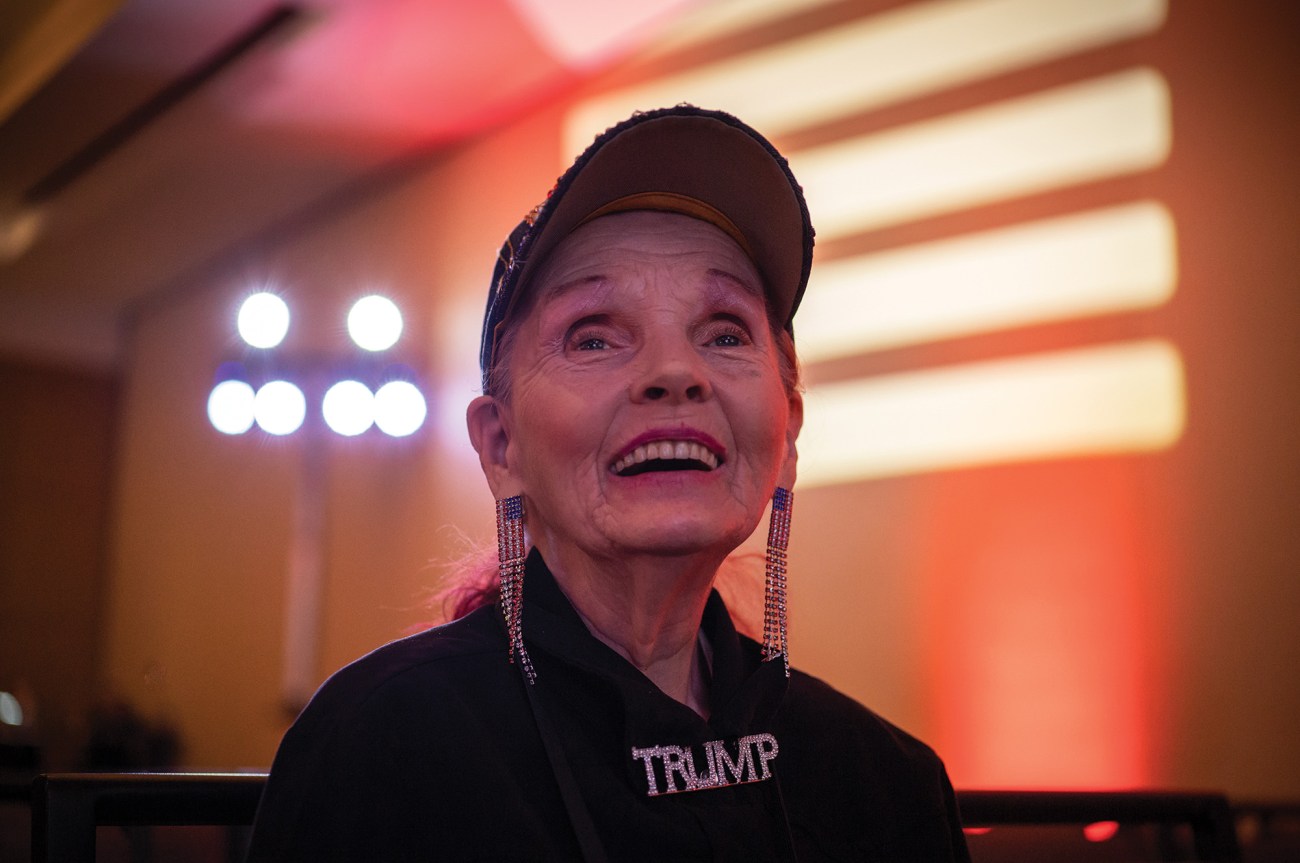
Attendees thrill to the opportunity to meet MAGA celebrities and mix with like-minded fans.
David Butow
Or like watching Family Feud. Liberals don’t treat their luminaries like rock stars. The stage at the liberal Take Back America conference in 2006 should have been a relatively safe space for then–New York Sen. Hillary Clinton. Instead, attendees booed her for supporting the Iraq War. Thut says the most news coverage Netroots ever got came in 2015, when Black Lives Matters protesters disrupted a speech by Bernie Sanders to complain that the candidates weren’t adequately addressing police violence and racial inequality. The protesters at the events, Thut says, are “always from our side.”
“We don’t have Joe Biden’s face on our shirts. We don’t have tattoos of Barack Obama on our arms, the hats, the putting-shit-on-your-cars,” says Filipkowski. “Have you ever seen ‘Build Back Better’ on a T-shirt?” He thinks few on the left would go to a progressive version of CPAC—certainly he wouldn’t. “Absolutely not.”
Many conservative conventions might feel like a circus, but AMPFest West actually had one. Hosted by the far-right group American Priority in early June at a resort in Palm Springs, California, AMPFest West promised a mashup of political convention and music festival. On the second night, attendees strolled under a big-top arch into the hotel garden, where they found a full-size Ferris wheel, a barbecue feast, popcorn machines, and a “bearded lady” face-in-hole board for photo ops. For four hours, conventioneers were serenaded with some of the most god-awful songs banned from Spotify.
The “patriot jam” featured a smorgasbord of MAGA rappers who bounced around the stage and yelled about Nancy Pelosi’s haircut or how “Fauci sucks.” Chandler Crump, 17, shared his popular number, “2 Genders.” One woman sang a song graphically describing a late-term abortion. MAGA rapper DVS 7.0 led a singalong of his anti-vax number “Not Gonna Take It.” His real name is Shawn Olivo, and he was filmed last year violently overturning a Covid testing booth in New York City with other protesters.
The virulently homophobic Christian rapper Bryson Gray, whose hit “Let’s Go Brandon” made him a minor celebrity, also wandered the conference halls in a “Make America Straight Again” T-shirt. During the VIP dinner, he leaped onstage to heckle gay speaker Chadwick Moore, an editor at the Spectator World, as a “false Christian,” insisting that “homosexuality is an abomination.”
Despite all that top-shelf talent, the crowd barely filled the Ferris wheel. Hefty ticket prices—$449 on up—may have been a deterrent. That’s a lot to drop on an event whose biggest headliner was former Trump campaign manager Corey Lewandowski, who had overseen Trump’s super-pac until last year, when he was excommunicated from Trumpworld after a donor accused him of groping her at a fundraising dinner.
AMPFest and its ilk are the direct results of attempts by more mainstream Republican events to purge the most clearly florid nutters. AMPFest hosts QAnon acolytes like Tracy Beanz and conspiracy theorists like Dinesh D’Souza, producer of the discredited 2000 Mules film that claims the 2020 election was stolen from Trump. He was banned, for now, from CPAC in 2018 for mocking survivors of the Parkland school shooting.
After getting my AMPFest West press badge, I headed to the opening meet and greet, where Tito Ortiz, the MMA fighter who was briefly a member of the Huntington Beach City Council, had drawn a crowd. I would tell you more about the rest of the event, but just as members of a New Mexico church group started to tell me how they’d come to the convention to help “save America,” a beefy bald dude with an earpiece confiscated my press pass and evicted me. I protested to Kerry Smyth, the AMPFest events manager, who is also the president of the Cheviot, Ohio, City Council. Even though I applied for, and had been issued, a press pass, he told me Mother Jones was an “unfair” socialist propaganda outfit.
I consoled myself by observing nationalists in the wild, as they played ping pong and showed off American flag swimsuits at the pool. I watched the musical acts from the tennis court. And I spent a lot of time wondering: What was American Priority anyway?
Traditionally, nonprofits, like the aforementioned American Conservative Union, which hosts CPAC, have organized such conferences. TPUSA is also a nonprofit. It files publicly available tax returns that provide a modicum of transparency. But AMPFest is a distinctly for-profit affair, as are many new arrivals on the right-wing event circuit.
When I registered for press credentials, I was required to pay $150, which is unheard of in the political conference world. Journalists generally won’t come if they have to pay—not just because we’re cheap—but because paying means we’re contributing to a political organization. I paid anyway. My receipt was from ALX Inc., a for-profit events company incorporated in Virginia.
The company was founded in 2018 by a Virginia wireless industry exec named Alex Phillips and conservative activist Ali Alexander, who organized the first disastrous American Priority event together. Alexander’s given name is Ali Akbar. He was convicted for two felonies (for theft and credit card fraud in Texas in 2007) and is one of the major figures behind the “Stop the Steal” movement. Though Alexander has not been an ALX officer since 2018, he and Phillips were both listed on the permit for the “Rally for Revival” held at DC’s Freedom Plaza the day before the Capitol insurrection. Phillips still runs AMPFest, and Alexander is now cooperating with the House committee investigating the events of January 6.
So maybe there was a reason why people who claim to care deeply about free speech weren’t keen on having mainstream journalists at their event in Palm Springs. No one from the organization responded to my questions or requests for comment, though they did give me a refund—and hope for the future. During my argument with Kerry Smyth over my ejection, he tried to soften the blow by telling me that all was not lost: If they liked my story, I could come to the next conference. There’s another one at the Trump Doral in October, just in time for the midterms.
